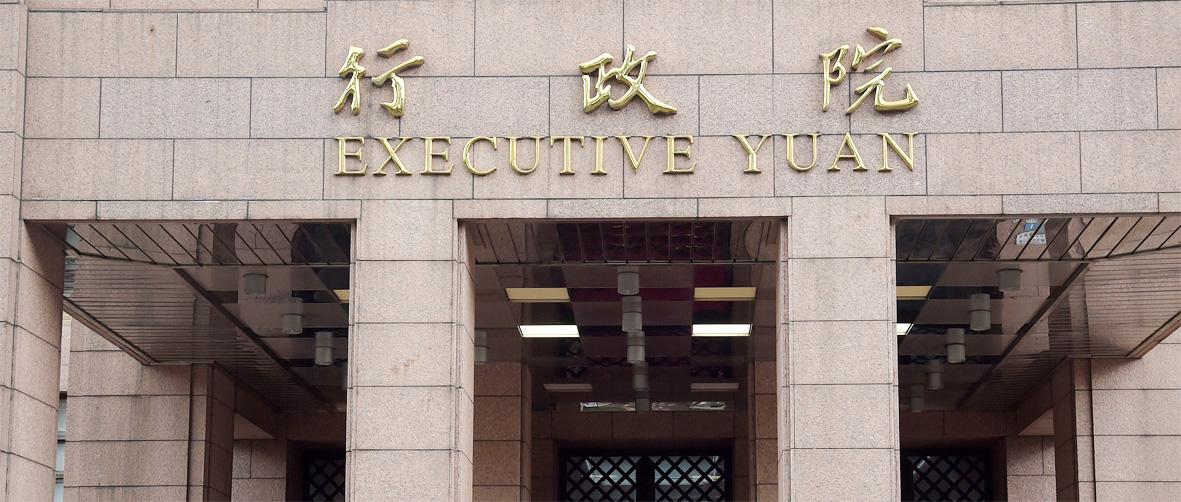The Executive Yuan yesterday approved a carbon pricing scheme to be imposed in phases starting with large emitters, with preferential rates granted to enterprises working to reduce their carbon output.
Although details are still being decided, the scheme would involve differential pricing to encourage emissions reduction, Environmental Protection Administration Deputy Minister Tsai Hung-teh (蔡鴻德) told a news conference after the weekly Cabinet meeting.
Phased implementation would begin with large emitters, meaning enterprises that produce more than 25,000 tonnes of carbon per year, Tsai said.

Photo: CNA
Other groups would be added successively after the initial law is passed, he added.
As for when the carbon fee would be introduced, Tsai estimated sometime in 2024 or 2025.
The scheme is included in sweeping amendments to the Greenhouse Gas Reduction and Management Act (溫室氣體減量及管理法) approved by the Cabinet yesterday, to be renamed the “climate change response act” if enacted.
The changes most notably seek to bring the law in line with the government’s goal of achieving net-zero emissions by 2050.
The act currently aims to cut emissions to less than half of 2005 levels by 2050, a target derided by climate activists as unambitious.
Premier Su Tseng-chang (蘇貞昌) lauded the passage as another milestone to commemorate Earth Day today, after President Tsai Ing-wen (蔡英文) a year earlier marked the occasion by setting the carbon neutrality goal.
Recognizing the urgent need to amend the conflicting target in climate law, Su told attendees at a meeting of the National Council of Sustainable Development in August last year to expedite the process.
Yesterday’s approval and a net-zero emissions road map released by the National Development Council late last month “are not only the first step to completing a legal system to support climate action, but are also significant for their signaling and substance,” Su said.
He also highlighted other important additions to the law, including a special clause on adaptation to climate change, clarifying the sustainable development council’s role as coordinator and requiring local governments to convene climate response committees.
With an eye to economic concerns, apart from carbon pricing, the amendments also include provisions to develop talent and technologies to help combat climate change, he added.

The Central Election Commission has amended election and recall regulations to require elected office candidates to provide proof that they have no Chinese citizenship, a Cabinet report said. The commission on Oct. 29 last year revised the Measures for the Permission of Family-based Residence, Long-term Residence and Settlement of People from the Mainland Area in the Taiwan Area (大陸地區人民在台灣地區依親居留長期居留或定居許可辦法), the Executive Yuan said in a report it submitted to the legislature for review. The revision requires Chinese citizens applying for permanent residency to submit notarial documents showing that they have lost their Chinese household record and have renounced — or have never

A magnitude 5.6 earthquake struck off the coast of Yilan County at 12:37pm today, with clear shaking felt across much of northern Taiwan. There were no immediate reports of damage. The epicenter of the quake was 16.9km east-southeast of Yilan County Hall offshore at a depth of 66.8km, Central Weather Administration (CWA) data showed. The maximum intensity registered at a 4 in Yilan County’s Nanao Township (南澳) on Taiwan’s seven-tier scale. Other parts of Yilan, as well as certain areas of Hualien County, Taipei, New Taipei City, Taoyuan, Hsinchu County, Taichung and Miaoli County, recorded intensities of 3. Residents of Yilan County and Taipei received

Taiwan has secured another breakthrough in fruit exports, with jujubes, dragon fruit and lychees approved for shipment to the EU, the Ministry of Agriculture said yesterday. The Animal and Plant Health Inspection Agency on Thursday received formal notification of the approval from the EU, the ministry said, adding that the decision was expected to expand Taiwanese fruit producers’ access to high-end European markets. Taiwan exported 126 tonnes of lychees last year, valued at US$1.48 million, with Japan accounting for 102 tonnes. Other export destinations included New Zealand, Hong Kong, the US and Australia, ministry data showed. Jujube exports totaled 103 tonnes, valued at

BIG SPENDERS: Foreign investors bought the most Taiwan equities since 2005, signaling confidence that an AI boom would continue to benefit chipmakers Taiwan Semiconductor Manufacturing Co’s (TSMC, 台積電) market capitalization swelled to US$2 trillion for the first time following a 4.25 percent rally in its American depositary receipts (ADR) overnight, putting the world’s biggest contract chipmaker sixth on the list of the world’s biggest companies by market capitalization, just behind Amazon.com Inc. The site CompaniesMarketcap.com ranked TSMC ahead of Saudi Aramco and Meta Platforms Inc. The Taiwanese company’s ADRs on Tuesday surged to US$385.75 on the New York Stock Exchange, as strong demand for artificial intelligence (AI) applications led to chip supply constraints and boost revenue growth to record-breaking levels. Each TSMC ADR represents